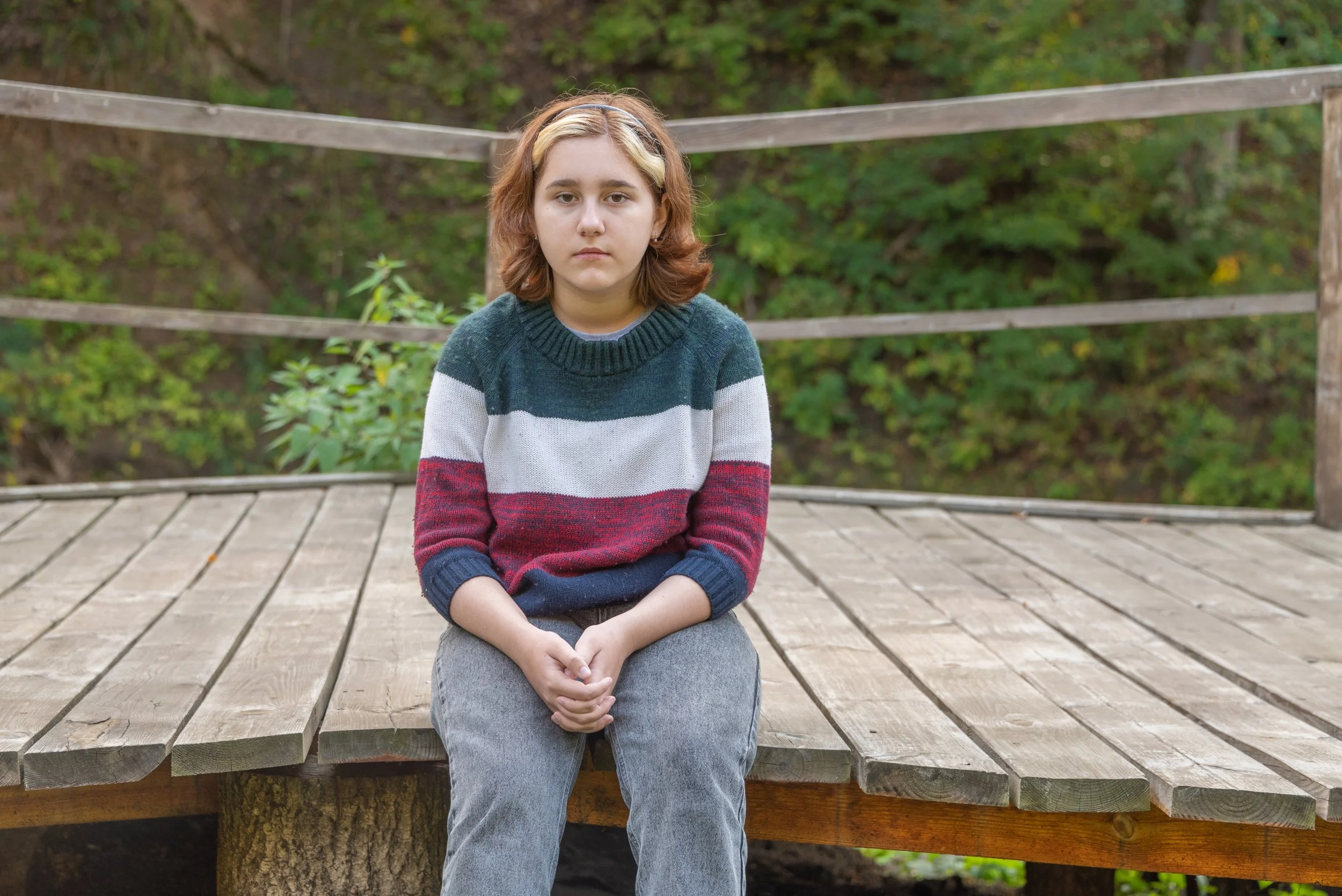Getting Through Adolescence
Therapy for Worried, Anxious, Socially Awkward Adolescents in Montclair, NJ and online
Middle school is a rough time for most kids, even the most mentally healthy. For those who may be developing anxiety and depression, the tween years are when you start to see the signs. Your concern may be reaching new heights as you watch your tween struggle to navigate friends, academics, and puberty, all against the backdrop of a quickly changing world.
Between the COVID crisis, the strange dangers of social media, the scary news of school shootings and climate change, all combined with the age old challenges of fluctuating hormones and typical teenage pressures, it's no wonder that we are seeing a massive rise in adolescent anxiety and depression.
Getting therapy is no longer considered weird or shameful for most kids. If you think your kid could benefit from learning and practicing coping skills, I’m here to support them. Some signs that your child needs that extra support from a therapist:
They turn inward, completely shutting themself off from you and others
They lose themselves in smartphones and video games
They avoid any emotional risk, such as asking for things directly or stating a need or a feeling
You notice yourself flailing, angry, and unsure how to help
You have background worry all the time as you observe your child acting in ways you don’t understand
You tell yourself that your child will outgrow these behaviors, but you fear, deep down, that this is a foundation for an entire personality.
While you’re doing everything you can to open up the lines of communication with them, they just keep shutting you out. It’s not your fault.
You are not alone, and I’m here to help.

The Struggle is Real
Overthinking has become all too common among American adolescents.
For some, this manifests as extreme avoidance of anything remotely risky.
For example, your teen might shrink away from the idea of making an actual phone call, relying on you to schedule appointments or anything else that requires real time responses rather than text. They get caught up in worries that they’ll feel awkward or say the wrong thing, and completely avoid the task.
If you observe that your teen isn’t living up to their potential, it may be related to overthinking. Growth requires risk. If your child doesn’t yet have the skills to cope with the discomfort that naturally accompanies growth, they will become stunted.
Addictions of all kinds may also be avoidant behavior in disguise. In other words, the obvious problem is “they are spending way too much time on video games/phones/screens.” They have become addicted.
But where do the addictions come from? Addictive behaviors feel safe for teens, well within their comfort zones. Anxiety holds them back from trying anything new. Kids need to learn the skills to create comfort for themselves while trying new things.
You absolutely can get your happy kid back.
They’re going through changes, and change is hard for most people. For tweens, the challenge is about the internal experience they’re having. They feel their emotions more strongly than adults do, and they do not yet have the language to explain that. The internal storm feels completely beyond their control.
Often there’s a “brain bully,” a constant internal critic telling them all the things that are wrong with them. Kids react to that bully in a variety of ways. They might shut down, or they might lash out, or vacillate between shutting down and lashing out. Sometimes, they harm themselves in an effort to quiet the mental noise.
So, the solution is to change the relationship with that bully.
Your kid can learn skills to take control of that relationship, rather than being endlessly victimized. Slowing down, tuning in, and then practicing some new behaviors will bring relief for your kid and your whole family.
Therapy gives your kid deeper understanding of what’s going on for them. They learn and strengthen vital skills that are not typically taught in school: emotional regulation, safe communication, and confidence.
Imagine your child coming home from school, visibly upset. You ask what’s wrong, expecting their typical response of screaming at you and running to their room, or perhaps just giving you the silent treatment. But instead, since your child has been taking part in regular therapy, they simply report that they need some time alone, and they go outside to take a walk. While still upset, they’re still able to join you for dinner. Eventually, they decide to share a bit of what’s going on: a disappointing grade on a test. They love this teacher, and had really wanted to perform well in the class.
The next day, they’ve come up with a solution: talk to the teacher. See what they can do to solve the problem.
Therapy can’t make problems disappear, but your child can use therapy to start making choices rather than acting impulsively.
And, therapy isn’t just for kids with big problems. Most kids (and adults!) can benefit from focused time spent compassionately engaging with their inner lives. For tween especially, the benefits are impactful as they can practice them for the rest of their lives. They get to move into adulthood with the skills that can then become more and more ingrained.
Anxious teens might show their distress in a number of ways.
Some become perfectionistic, obsessing over every detail of a project so much that they can’t make any forward motion on that project, for fear of ‘failing.’
Some engage in behaviors that we consider ‘compulsive,’ and when you try to encourage them to stop, they become very distressed, worried that something terrible will happen if they don’t do the behavior
Some have learned to avoid anything challenging, so that they are never getting accustomed to taking risks and learning the confidence that comes along with getting through a hard thing.
The reason to come in for therapy is simply knowing that something is not right, that there is some internal barrier holding your child back from creating a rich and meaningful life. Whether the correct label is anxiety, depression, or something else, there are approaches that will work for her and your family as a whole.
One of the main themes of therapy for teens is to develop a robust vocabulary for describing internal dynamics. We need to move beyond “good,’ “bad,” and “fine” as descriptors for feelings. The more granular the description, the more control a person has over how to respond to those feelings.
Since many teens are reluctant to simply talk for an hour, therapy for adolescents makes heavy use of more creative means of expression, such as art, collage, game playing, poetry, and music. This engages parts of the brain that often go underutilized. It allows for a more varied toolbox of ways to cope when emotions get difficult.
But…will this work for my kid?
It’s natural to have some concerns about starting your teen in therapy. It’s new and different.
I do my best work with tweens who are experiencing perfectionistic anxiety. This was my own personal experience, and I work with it daily in my clients. I also love connecting with kids who have been through trauma, to help them see themselves as more than a victim. I love helping them define who they will become, and empower them to move forward in their chosen direction. We build confidence this way.
There are some instances where I would not be the best fit, such as addiction issues or eating disorders. For those families, I would gladly offer referrals to more appropriate resources.
If your tween is actively engaging in food restriction or is obviously addicted to drugs or alcohol, I will gladly refer you to a better fit.
-
In therapy, we practice ways to shift responses. We talk about what’s happening inside of your child’s brain and body that is creating moods and mindset, and with that knowledge, you child will be empowered to make change. You may have heard of some of the techniques often used, such as Cognitive Behavioral Therapy (CBT) and Eye Movement Desensitization and Reprocessing (EMDR). These are among a number of approaches that have strong scientific support for their effectiveness, and I lean heavily on them to guide my work with teens.
But that’s not all! Because we are still building vocabulary around emotions, we will also lean on other means of communication. Art, role play, music, sensory exploration, and experiences in nature all come into play. Just about any activity can become therapeutic if we create the right setting for healing to occur.
-
Therapy is an investment in your child’s future. Particularly for young clients, the returns on this investment are immeasurable.
Kids who learn early how to identify, accept, and navigate their emotional landscape are set up for a much easier journey through life. You child will experience decreased stress, increased life satisfaction, and more confidence. To have a private tutor in emotional health will give your teen a wealth of skills and perspectives that will serve them for the rest of their lives.
You may also find that your insurance will cover all or part of the cost of therapy. Click here for more information on that.
-
No! It doesn’t have to! It’s true that some people find the process of therapy so helpful in maintaining their mental stability that they decide to continue sessions without setting an end point.
That’s not everyone’s experience.
We can set definite behavioral goals so that we know when it’s time to end therapy. The last thing I ever want is for you or your child to feel stuck in a process that isn’t serving them. Learning to let go is a huge life skill that can be safely practiced in the therapy relationship.
-
It's normal to feel hesitant or uncomfortable about opening up at first. In fact, a teen who expresses reluctance is doing a good job at self advocacy and boundary setting.
That’s why I work so hard to create a safe space. I am already on your side, and invested in your family’s well-being. Trust takes time to build, and that’s ok.
I find that allowing the child to share their interests and use those as a jumping off point for therapeutic collaboration is a really good way to build that trust.
Nature therapy is also a great option for teens, as it brings in a physical element and feels more normal than sitting in an office talking to a therapist.
-
Typically, I recommend that parents come in for consultation monthly. You will almost definitely see positive change happen faster if you also engage in your own work. I will provide guidance in creating a plan for your entire family, and encourage you to use time for your own work. If you need a referral to your own therapist, I can offer that as well.
While I completely understand how self care can seem like a low priority item, the truth is that your child can’t do the work alone. If your child’s new self triggers something in you or someone else in the family, that needs to be addressed in order for healing to occur.
Let’s get started today.
If you’re ready to get started on making positive changes for your whole family, I’m ready to help you.
Start now and your teen will soon be operating with a whole new set of tools to manage life. During your free 10 minute phone consultation you can start getting a feel for how I can help and we can discuss next steps.
Email me to schedule your free phone consultation today at sonja@sonjaseglin.com.



